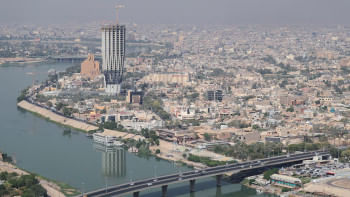“Values” without borders
In the wake of the Paris and San Bernardino attacks, prominent US Republican senators have called for measures for stemming the entry of Syrian refugees. It is amazing how the plight of the unfortunate people fleeing war and famine has been turned into a political game. Ironically, many of those who are opposed to allowing the refugees a safe haven in the United States argue that the migrants from Islamic countries do not share "American values" and are therefore misfits here. The discourse about American values always makes me cringe since it ends up giving the impression that people who have a legal status in the US are on a higher moral ground. And the helpless men, women and children seeking refuge from violence and terror are ethically inferior.
Unfortunately, no one has offered a well-articulated definition of what these zealously guarded "values" are. The reality is, a country's values come into sharper focus when it is faced with difficult humanitarian choices. And these virtues shine more brightly when people make sacrifices to help the less fortunate. By this definition, America's values have fallen short of expectations.
I believe that there are two issues that one needs to appreciate about the refugee problem. The first is fairly straightforward – no self-respecting human being wants to leave his home and familiar surroundings and seek asylum in an unfamiliar and often unwelcome territory unless he is pushed against the wall. The second is more important: once a refugee takes the leap, he usually tries his best to integrate and imbibe the value system of the host country. But assimilation requires patience and understanding both on the part of the immigrant and the host country.
Perhaps I should illustrate these points by narrating my personal experience as a refugee in India in 1971. I arrived in West Bengal both physically and spiritually shattered – I had lived through the carnage of March 26 and the fear of being hounded by the Pakistan army for three months. My parents decided that I would be safer and that my life would have a purpose if I crossed the border and participated in the country's Liberation War. When I think of it now – I cannot understand how they parted with their teenage daughter, despite the dread of an uncertain and challenging future. But then it happened to many youngsters like me. The point is those were exceptional times and people were not using the kind of rationale that they do under normal circumstances. And this is true for most individuals who leave their familiar environs and take refuge in an unknown land.
Luckily I received a warm welcome on the other side. And it reinstated my faith in the goodness of man. I developed a deep love and respect for the people and the country that gave me a chance to live again after the crushing experience of being shipwrecked in my own country. The thing that continues to amaze me is that ordinary folks responded to the millions of Bangladeshi refugees with extraordinary gestures of humanity: providing shelter, food, monetary help and emotional support. We were all welcomed and accepted, irrespective of our religion or social background. The crisis revealed the best of human nature!
I am shocked that we, in the United States, talk about our superior values and yet have shown so little compassion for the men, women and children who are fleeing from the horrors of a war. We have closed our doors to thousands of innocent people because of a preconceived notion that they may pose a security risk. The media is full of the story of the Paris terrorist with a Syrian passport but the heartbreaking picture of the 3-year-old Syrian boy's dead body washed ashore has been consigned to oblivion. How can we brag about our values when we have shown such callous indifference to the hapless people caught between the chemical weapons of the Assad regime and the barbaric killings of the Islamic State?
People don't carry values across the ocean, for values are not permanent features etched in our psyche. We human beings evolve and we are capable of learning from our environment. I know that the months I spent as a refugee have taught me that the best values are those that inspire us to be compassionate and kind to the less fortunate, irrespective of their religion or class. The men and women who distributed blankets to the Bangladeshi refugees in the squalid camps, gave them food and comforted them with kind words continue to restore my faith in humanity each time I am disillusioned. When I forget to be kind or compassionate I am reminded of their radiant faces – and I realise that the least I can do is give back a little of what these exceptional people gave me. These are the values I want to live by – I don't know whether these virtues are American or Indian or Syrian, but I do know that they are human values.
The writer is a renowned Rabindra Sangeet exponent and a former employee of the World Bank.
E-mail: [email protected]

 For all latest news, follow The Daily Star's Google News channel.
For all latest news, follow The Daily Star's Google News channel. 



Comments